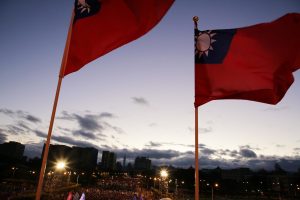Taiwan’s opposition Kuomintang (KMT) sponsored two resolutions on strengthening ties with the United States that both passed unanimously, a rare occurrence in the country’s bitterly divided legislature.
One resolution encourages Taiwan to push the United States to help Taiwan defend itself against Chinese threats, pursuant to the U.S. government’s Taiwan Relations Act (TRA). The other states that Taiwan should focus its diplomatic relations with the U.S. toward eventually reestablishing formal ties between Taipei and Washington.
It’s an audacious move by the KMT, which generally vouches for warmer ties with Beijing while the ruling Democratic Progressive Party (DPP) pursues a China-skeptical strategy of strengthening relations with the United States and the international community at large.
The DPP supported both resolutions. After both passed unanimously, the KMT complimented the DPP on its official Twitter account.
“A big shout out to @DPPonline for supporting our resolutions in the Legislative Yuan and helping us pass them unanimously!” the tweet read. “One landmark resolution calls for restoration of official ROC-US relations.”
The KMT introduced the resolution after Foreign Minister Joseph Wu said in a September 22 interview with NPR that Taiwan is “not seeking full diplomatic relations with the U.S. at this moment.”
Wu added that “there’s a lot of room for us to explore how to strengthen the relations between Taiwan and the United States, and we have been advocating that Taiwan and the United States should further strengthen economic relations, trade relations, political relations, even security relations.”
After the resolutions passed, the KMT said it was surprised at the DPP support for the resolutions and chided Wu and President Tsai Ing-wen, saying they must take action to act on the resolutions lest the public “see through their tricks.”
A Foreign Ministry spokesperson said Taiwan and the United States would continue working to deepen cooperation in defense and other areas but did not answer questions about whether Taiwan would push to resume formal diplomatic ties with Washington.
The resolutions were broadly interpreted as a victory for the KMT’s youthful, reform-oriented chairman, Johnny Chiang, who promised to reshape the party’s China-friendly image and give it appeal to younger voters before winning the party chair election earlier this year.
They could also have the effect of needling the DPP at a time when Beijing has increased its military aggression and the United States has reportedly considered making firmer public commitments to defending Taiwan.
The Tsai administration has prided itself on its close ties with the United States but has never openly pushed for formal diplomatic ties – either as Taiwan or as the Republic of China (ROC) – a proposition Washington would likely reject and which could be interpreted by Beijing as a move toward declaring independence.
The resolutions could be aimed at causing friction within the DPP, which last year formed an uneasy alliance between supporters of Tsai’s more cautious status-quo approach and supporters of a firmer path toward Taiwan independence.
Tsai was challenged in the party’s presidential primary by William Lai, a prominent member of the latter group, and later named Lai her running mate in pursuit of party unity.
Some in the independence-leaning faction of the DPP would like Washington to make firm commitments to defending Taiwan from Chinese aggression and to formalizing diplomatic relations with Taipei.
While the TRA states that United States will support Taiwan’s defense, it allows Washington “strategic ambiguity” on the question of what to do if China actually invades – the U.S. does not state publicly whether it will or will not come to Taiwan’s defense.
The Financial Times reported last month that officials in Donald Trump’s administration have mulled eliminating the policy of “strategic ambiguity,” meaning that Washington could publicly commit to defending Taiwan from Chinese attacks. The DPP, however, has never openly pushed the U.S. to do so.
The KMT was also careful to call for restoration of “ROC-U.S. relations” rather than Taiwan-U.S. ties. The country’s formal Republic of China identity remains foundational to the KMT; the DPP has worked to rebrand the country as “Taiwan” in potential pursuit of an independent country under that name.
The DPP recently unveiled redesigned passports that deemphasize “Republic of China” in favor of “Taiwan.” The KMT, regardless of who leads the party, will certainly fight tooth and nail to keep the concept of the ROC alive.

































